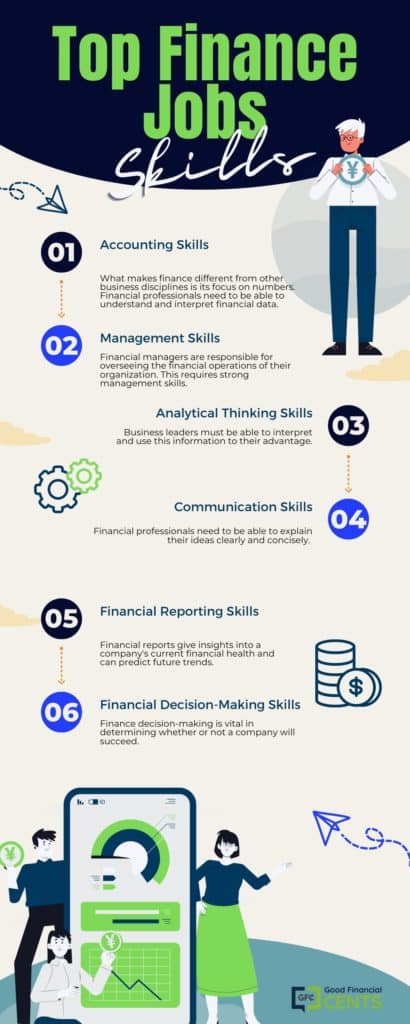Job security is always a concern when choosing a career, but some fields are more recession-proof than others. And while there’s no guarantee that any job will be immune to cutbacks or layoffs, some industries weather economic storms better than others.
One industry that tends to be recession-resistant is finance. After all, people will always need financial services, whether investing their money, taking out loans, or managing their taxes. And while the finance industry has seen its share of ups and downs over the years, it generally bounces back fairly quickly after a downturn.
If you’re considering a career in finance, you’re probably wondering what the best-paying jobs are. With this in mind, we’ve compiled a list of the highest-paying finance jobs for 2023.
12 Highest Paying Jobs in Finance

While many finance jobs pay well, the following 12 positions sit at or near the top of the pay scale in 2023:
1. Chief Financial Officer
Average salary: $314,481 per year
As a financial executive, the chief financial officer (CFO) is responsible for the financial health of an organization. The CFO role is multi-faceted and includes everything from financial planning and analysis to business budgeting, financial decision-making, and risk management. CFOs typically have a deep understanding of economic theory and practice and strong analytical and problem-solving skills.
CFOs are some of the highest-paid finance professionals because they have experience and networks and excel at financial leadership.
2. Financial Manager
Average salary: $134,180 per year
Out of all the finance jobs available to college graduates, financial managers are some of the highest-paying, with high demand for workers in this field. According to the U.S. Bureau of Labor Statistics, employment numbers for Financial Managers are expected to rise by 17% over the next decade, faster than the average for all occupations.
Financial managers are similar to personal financial advisors, except they monitor businesses’ financial well-being instead of individuals. Most financial managers have previous experience working in market analysis and forecasting positions similar to this one.
Financial managers are responsible for developing long-term financial plans, directing investment activities, and generating financial reports for their company. They may work in various industries, such as investment firms, accounting firms, banks, or the government.
Employment numbers for Financial Managers are expected to rise by 17% over the next decade, faster than the average for all occupations.
3. Chief Compliance Officer
Average salary: $114,832 per year
A chief compliance officer ensures financial institutions adhere to all applicable laws and regulations. To keep a business running smoothly and help avoid costly non-compliance fees, CCOs monitor company policy and compliance.
This can be a demanding job, as the financial sector is heavily regulated. But it can also be rewarding, both financially and professionally. Chief compliance officers often have a degree in finance, law, accounting, or business administration. They also have experience working in the financial industry, usually at a senior level.
4. Insurance Advisor
Average salary: $89,295 per year
An insurance advisor’s primary job is to help customers find the best insurance products for their short- and long-term needs. This covers all areas of insurance – from life and home/auto coverage to financial planning services.
But an insurance advisor’s responsibilities go beyond simply finding the right policy. They must also help customers understand their coverage, file claims, and manage their accounts. In short, they are financial planning counselors who help people protect their assets.
A Bachelor’s degree in finance or a related field is required, and a CFP(Certified Financial Planner) certification is preferred for insurance advisors.
5. Hedge Fund Manager
Average salary: $83,578 per year
Who doesn’t want to make a fortune by correctly predicting the stock market? Hedge fund managers do just that. A hedge fund is a type of investment fund that uses financial instruments to offset the risk of investments. Hedge fund managers use their knowledge of the financial markets to manage their investment objectives, liquidity, and risk.
Hedge fund managers typically have a degree in finance, programming, economics, quantitative finance, or business administration.
6. Financial Examiner
Average salary: $81,410 per year
The financial examiner is responsible for managing risk, ensuring compliance with laws and regulations, and verifying that banks have adequate liquidity to cover unexpected losses. Financial examiners typically earn high salaries and enjoy above-average growth prospects.
Financial examiners are the middlemen between finance and law. Overall, their primary focus is ensuring that companies comply with all regulations so that nothing is mismanaged.
A minimum of a bachelor’s degree is needed for this profession.
7. Personal Financial Advisor
Average salary: $74,055 per year
Financial advisors help people invest their money after learning about their financial goals. They also often guide major life events, like saving for retirement or a college education. Because much of an advisor’s job revolves around talking to clients and seeking new investment opportunities, excellent communication skills are essential in this role.
8. Senior Accountants
Average salary: $73,547 per year
Senior accountants are responsible for managing the financial records of their organization. This includes preparing financial statements, maintaining ledgers, and overseeing budgeting. Senior accountants typically have a bachelor’s degree in accounting or a related field, along with a Certified Public Accountant (CPA) or similar designation.
9. Investment Banker
Average salary: $72,133 per year
As per the name, investment banking is the industry that banks use to invest in other companies. Investment bankers work with clients(businesses or government groups) to identify their financial needs and offer investment products, like stocks and bonds, to help them achieve their goals.
This is a very high-pressure job that requires being able to think on your feet and make quick decisions. Investment bankers also need to be able to work long hours, as they often have to travel to meet with clients.
10. Financial Analyst
Average salary: $70,677 per year
If you’re excellent with numbers and have a background or interest in finance, working as a financial analyst may be the perfect job for you. Financial analysts aid businesses and individuals by providing advice about how to invest money wisely. They keep track of economic trends, help make decisions about investments, and calculate value and risks.
They assist financial institutions, such as banks and insurance companies, with customer buying decisions and identifying their overall needs.
11. Information Technology Auditor
Average salary: $59,676 per year
Information technology auditors ensure that financial institutions have adequate controls to protect their information assets. This includes everything from systems and databases to applications and networks. IT auditors typically have computer science, information systems, or accounting degrees.
IT auditors are responsible for conducting audits and should therefore be experts at this task, which may require financial institutions to appoint them.
12. Budget Analyst
Average salary: $53,690 per year
Budget analysts are important in keeping companies organized and compliant with regulations. They help businesses and individuals budget by evaluating their spending and finding ways to save money. Budgeting can be tricky, but budget analysts have the skills and knowledge to make it easy.
Budget analysts typically work in the government or for accounting firms.
Related: How Much is $55k Annual Salary Per Hour?
What Skills Do You Need to Succeed in Finance

Whether you’re looking to become a financial analyst or an investment banker, there are certain skills you’ll need to succeed in finance. These include:
Accounting Skills
What makes finance different from other business disciplines is its focus on numbers. Financial professionals need to be able to understand and interpret financial data. This requires strong accounting skills.
Management Skills
How you manage your own finances is one thing, but being able to manage the finances of an entire company is another. Financial managers are responsible for overseeing the financial operations of their organization. This requires strong management skills.
Analytical Thinking Skills
Employers need workers who can compile financial statements, but business leaders must be able to interpret and use this information to their advantage. This is referred to as financial statement analysis: a comprehensive review of key financial documents to assess a company’s effectiveness. This task requires strong analytical thinking skills.
Not only finance but every business discipline requires good analytical skills as employers always seek those who could think outside the box.
Communication Skills
Finance is a complex field, and communicating effectively is essential for success. Financial professionals need to be able to explain their ideas clearly and concisely. With so much at stake, there is no room for error when communicating with clients or business partners.
Financial Reporting Skills
Although it’s important to analyze past data, finance professionals know that looking forward is key to success. This is why financial reporting skills are essential. Financial reports give insights into a company’s current financial health and can predict future trends.
Thinking critically is of the utmost importance for business leaders when it comes time to make big decisions like hiring, budgeting, and strategic planning. Therefore, if you want your resume to stand out, including this skill is a must!
Financial Decision-Making Skills
Making decisions is key for anyone who wants to be a business leader. While leaders need to understand an organization’s goals and objectives, they also need to be able to make decisions that will help their company achieve these goals.
This requires an understanding of financial concepts and an ability to think creatively and develop innovative solutions. Finance decision-making is vital in determining whether or not a company will succeed.
These are key skills you’ll need to succeed in finance. If you have two or three of these skills, you’re on your way to a successful career in this exciting field.

The Benefits of a Career in Finance
Who knows, with a career in finance, you might even be able to retire early! But seriously, there are many benefits to pursuing a career in finance.
Some of the benefits of a career in finance include the following:
Huge Range of Roles and Job Security
As with any industry, various roles are available in finance. And because the financial sector is so important to the functioning of the economy, it’s safe to say that there will always be a demand for financial professionals.
This means your job is likely secure no matter what happens in the economy. And if you’re looking for a change, there are plenty of other roles you can pursue within the financial sector.
High Earning Potential
Never underestimate the earning potential of a career in finance! If you’re good at what you do, you can make a lot of money. Many finance professionals are among the highest-paid workers in the world.
Of course, your salary will depend on several factors, including your experience, education, and the company you work for. But if you’re looking to make a good living, a career in finance is worth considering.
Most Finance Professionals Are Highly Satisfied with Their Jobs
In an era of increased job dissatisfaction, it’s refreshing to know that some professions still offer high satisfaction levels. According to a Moster.com survey, finance is one of these professions.
While the survey is several years old, it found that finance professionals are some of the most satisfied workers in the world, with 36% of respondents saying they are satisfied with their jobs.
This is likely due to a finance career’s high earning potential and job security. Finance is worth considering if you’re looking for a stable and satisfying career.
Flexibility and Room for Growth
One of the great things about a career in finance is that it offers a lot of flexibility. There are many different types of finance jobs, so you can easily find one that suits your lifestyle.
And because the financial sector is always changing, there’s always room for growth in your career.
Is a Career In Finance Right for You?
Perhaps you’ve read through the list and wondered if a career in finance is right for you. Here’s a video to help you assess your skills and interests and decide on a career, whether it’s in finance or something else!
FAQs about Finance Careers
There is no easy answer when it comes to the hardest finance job. It depends on your skillset and experience. Some people find investment banking, controllers, tax managers, and valuation analysts to be the most challenging, while others find corporate finance more difficult.
Accounting is often considered the least stressful finance job. This is because it generally doesn’t involve as much pressure as other finance roles.
Chief Executive Officers such as chief financial officers (CFOs) oversee the entire company and have high salaries. The CFO primarily controls financial affairs.
There are a few reasons why finance jobs pay so well. First, finance is a very important sector of the economy, and those working in finance are responsible for ensuring that businesses and individuals have the capital they need to succeed.
Second, finance is a highly specialized field, and those who work in finance have spent years studying and training for their careers.
Finally, finance jobs are often very demanding, and those who work in finance are often willing to work long hours to finish the job.
The Bottom Line: Is a Career in Finance Worth It You?
A finance degree is valuable to students. Entry-level finance majors earn an average of $55,000 a month. Compared to mid-career salaries, they are about 101,000 a month.
According to the Bureau of Labor Statistics Occupational Outlook Handbook, this is remarkably higher than the median annual wage of $45,760 in the USA. In other words, finance majors make a lot of money. And that isn’t the path for you, you can always consider these self-employed job ideas.
Cited Articles
1. U.S. Bureau of Labor Statistics (2022, Sep.8) Occupational Outlook Handbook: Business and Financial Occupations. Retrieved from https://www.bls.gov/ooh/management/financial-managers.htm
2. Monster.com Workforce Talent Survey – Finance and Accounting (2013, June 25). Retrieved from https://www.businesswire.com/news/home/20130625005528/en/Monster.com-Survey-Reveals-Finance-Accounting-Workers%C2%A0are-Satisfied
3. U.S. Bureau of Labor Statistics (2022, Sep.8) Occupational Outlook Handbook: Business and Financial Occupations. Retrieved from https://www.bls.gov/ooh/business-and-financial/home.htm
